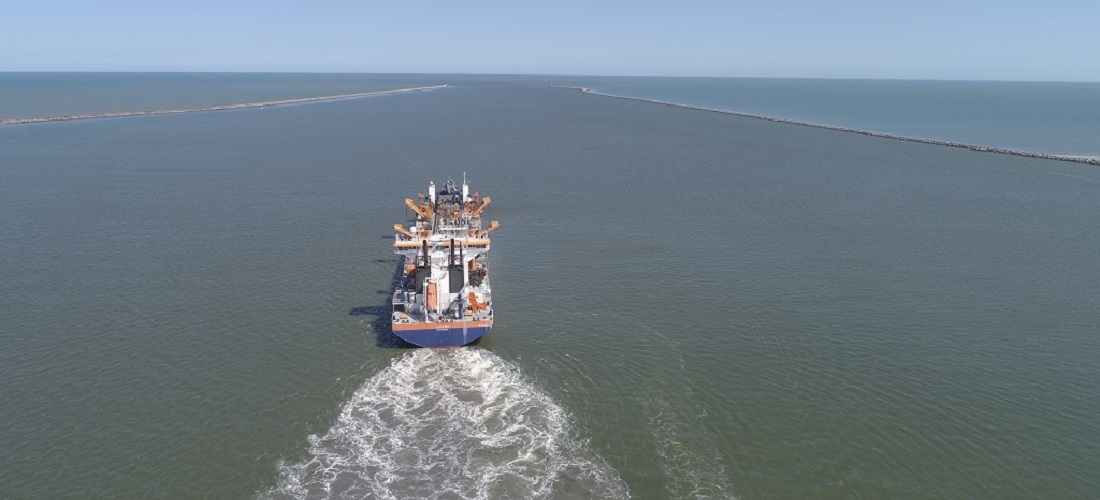
Port companies push for increased predictability in dredging initiatives
Oct, 04, 2024 Posted by Gabriel MalheirosWeek 202439
Claudio Loureiro, the executive director of Centronave (National Center for Transatlantic Navigation), an organization that represents international shipping companies, called on the Ministry of Ports and Airports (MPor) last Tuesday (1st) for greater predictability in investments in the port sector, with clear goals and defined objectives regarding dredging and channel deepening plans.
Loureiro stated that the sector has the resources to carry out the projects but noted losses amounting to $50 million due to uncertainties. The government’s struggles to advance dredging works drew criticism at an event held by the Joint Parliamentary Front of Ports and Airports (FPPA) and the Brazilian Infrastructure Institute (IBI) in Brasília.
“Last year, we had an average waiting time of 121 hours with cargo on board—cargo with delivery commitments. I have the funds for dredging, and I can’t proceed,” said Loureiro. He also complained about delays in launching new bids for container terminals, adding, “There aren’t enough berths for docking.”
Alex Ávila, Secretary of Ports at MPor, emphasized that dredging is high on the ministry’s agenda and acknowledged the sensitivity and complexity of the issue, as adequate dredging is essential for cargo operations. He mentioned that the government is closely following developments related to both maintenance dredging and channel deepening, in coordination with port authorities.
Paranaguá Concession
Ávila highlighted that the main focus for dredging is the idea of concessions, such as that for the access channel to the Port of Paranaguá, which is expected to be tendered by April 2025. The feasibility study for the concession is set to be submitted to the Federal Court of Accounts (TCU) within the next 30 days. As the first concession of an access channel for a public port, the project is expected to set a benchmark for future concessions.
“Our goal is to provide the best possible concession model to the market, aiming for a successful auction, starting with Paranaguá, which is at a more advanced stage, for a minimum of the next 25 years,” Ávila stated.
Regarding the industry’s criticism of the lack of clarity, Ávila responded that such feedback is “always very welcome” and will be taken into consideration. “[The criticisms] help us understand the market’s perspective,” he said.
Table 1
Without adequate investments, the “Table 1” charges—the tariffs paid by ships to ports—also faced criticism. Loureiro from Centronave stated that he pays the Table 1 charges at Santos without receiving appropriate returns. “It’s outrageous. There’s so much wrong around it,” he remarked.
According to regulations from the National Agency for Waterway Transportation (ANTAQ), if ports fail to provide services commensurate with the fees charged, the agency can reduce the Table 1 prices. ANTAQ director Flávia Takafashi said that dredging is a matter of high priority for the agency, especially due to its relationship with port tariff enforcement.
Flávia mentioned that the agency frequently receives complaints and concerns from the industry regarding the ports’ ability to accommodate large vessels and invest in deepening access channels and berth depths. Despite holding only three major board meetings this year, she said the agency plans to delve into the issue and present a report in 2024 identifying ports that have invested and subsequently adjusted their tariffs.
“We are finalizing it now. We’ve had meetings involving the three directors, with oversight from each of these processes,” she said, adding that about ten years ago, the agency implemented a specific monitoring program to closely track the application of such investments.
Merchant Marine Fund
Speaking at the event, the National Secretary for Waterways at MPor, Dino Antunes, who oversees the hydrographic concessions agenda, stated that the government is working to ensure that the winner of the auction will know in advance that they can access resources from the Merchant Marine Fund (FMM).
“The winner could apply for financing priority even before the auction,” he said. “We’ve already inaugurated this model of phase inversion, so to speak, in cooperation with Petrobras on FPSO [Floating Production, Storage, and Offloading platforms].” According to Antunes, the process, which is straightforward, is expected to be addressed by December, when the next meeting on the fund will be held.
Speaking to business leaders, Dino reiterated the challenges the ministry faces in communicating about concessions and noted that the biggest bottleneck in the waterway sector at present is environmental issues.
Source: Agencia Infra
-
Grains
Feb, 23, 2022
0
Russia-Ukraine crisis worsens and causes wheat prices to soar
-
Meat
Mar, 24, 2025
0
Productive Sector Celebrates Historic Record in Meat Exports for the First Two Months of 2025
-
Blog News (ENG)
Oct, 10, 2023
0
Port of São Francisco do Sul triples corn exports in 2023
-
Grains
Apr, 26, 2024
0
As corn retreats, Brazil’s leading grain state bets on alternatives

